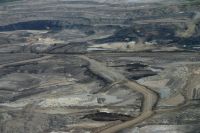Today's newspapers carry reports of a fascinating government briefing note that advised Canada's Minister of Finance to cut back on federal tax breaks to fossil fuel producers. The question now is whether ministers are listening.
The leaked briefing note, quoted extensively in an article by journalist Mike De Souza, advised Finance Minister Jim Flaherty to "lead by example" before this summer's G20 summit in Toronto by committing to phase out subsidies that benefit the companies producing oil, natural gas and coal.
Those subsidies are on the summit's agenda thanks to a commitment that G20 leaders reached last September in Pittsburgh, where — under the leadership of the Obama Administration — they agreed to "[r]ationalize and phase out over the medium term inefficient fossil fuel subsidies". As a starting point in reaching that goal, G20 leaders asked their energy and finance ministers to report back to them on strategies and timeframes at Canada's summit this June.
According to the media reports, the top bureaucrat at the Department of Finance recommended in no uncertain terms that Canada live up to this commitment. In a briefing note to the minister, he wrote that phasing out fossil fuel subsidies could help improve Canada's international reputation and would be consistent with the government's stated economic policy goals.
The briefing note explains that the time for tax breaks to the fossil fuel sector is over: "These measures were historically premised on factors such as exploration risk, spillover benefits of exploration to third parties (similar to R&D), large capital requirements, price volatility, and a desire to be competitive. Today, however, it is not clear that these factors are unique to the sector or merit preferential treatment."
According to Pembina's estimates, the Government of Canada's current tax breaks for the oil and gas sector are worth somewhere in the neighbourhood of $2 billion a year. (In comparison, today's newspapers also carry stories about the high costs of security at the G8 and G20 summits, which is estimated to cost up to $1 billion.) Particularly at a time when the government is facing a deficit, it's easy to envision better uses for this revenue than subsidizing the production of the fossil fuels that are responsible for the overwhelming majority of our greenhouse gas pollution. Instead, we would love to see that revenue invested in the transition to a clean energy economy in Canada and used to support climate action in developing countries.
Understanding Canada's Tax Breaks to the Fossil Fuel Sector
In 2005, Pembina economist Amy Taylor published a comprehensive analysis of federal subsidies to the oil and gas sector. Using 2002 data (the most recent available at the time), Amy found $1.4 billion in annual tax subsidies to Canada's oil and gas industry.
 The report's methodology compared the tax treatment of the oil and gas sector to a "neutral" tax system, meaning a system that does not favour one industry type over another.[1] In 2006, the Department of Finance published a plan called Advantage Canada that committed to "enhancing the overall fairness and neutrality of the tax system" — which means that reducing tax breaks to favoured sectors should be part of the government's tax policy even without the G20 commitment.
The report's methodology compared the tax treatment of the oil and gas sector to a "neutral" tax system, meaning a system that does not favour one industry type over another.[1] In 2006, the Department of Finance published a plan called Advantage Canada that committed to "enhancing the overall fairness and neutrality of the tax system" — which means that reducing tax breaks to favoured sectors should be part of the government's tax policy even without the G20 commitment.
Since Amy's report was published, there has been some progress — albeit at a very slow pace. In Budget 2007, the government committed to phase out the "accelerated capital cost allowance" for the oilsands by 2016, starting in 2011. The government has also ended two other tax advantages, "earned depletion" and "resource allowance" subsidies. A specific subsidy for Syncrude ended in 2003.
On the other hand, the federal government has reduced the overall tax rate for the oil and gas sector relative to its 2001-02 level. (In 2002, the higher tax rate that the sector paid was equivalent to a debit of $92 million relative to a neutral tax system.)
Several of the subsidies to the fossil fuel sector noted in Pembina's 2005 report continue unchanged, including the:
- Canadian Exploration Expense
- Canadian Development Expense
- Canadian Oil and Gas Property Expense
- Atlantic Investment Tax Credit and
- Scientific Research and Experimental Development Tax Credit.
In 2002, the value of those subsidies added up to about $1.1 billion.
And Canada's oil and gas sector has been growing significantly. The subsector that includes refining has seen revenue growth of about 15 per cent per year (1998-2007), while the total value-added (GDP) of the mining, quarrying and oil and gas extraction sector has grown from $50 billion in 1999 to over $55 billion in 2007 ($2002).
As a ballpark figure, then, we estimate that the current federal tax subsidies to the oil and gas sector are now in the range of $2 billion a year.
Of course, that's just an estimate. We would love to be able to refine it by seeing the federal government's own estimates of the tax subsidies it provides to oil and gas — something that we would expect them to publish as part of the "implementation strategies and timeframes" that their G20 commitment requires.
We believe that living up to our commitment is the right thing to do, both for economic and environmental reasons. And thanks to today's media reports, we now know that very senior officials inside the federal government have made a persuasive case that Canada needs to end its tax breaks to fossil fuel companies.
The leaders of the G20 will assemble in Toronto on June 26, and the G20's finance ministers will meet in South Korea next week in prepare for that summit. This leaves Minister Flaherty and Prime Minister Harper just over four weeks to show that they're paying attention to their own experts and prepared to lead.
[1] Specifically, this means the same general tax rate is applied to all activities, operating costs are fully deductible in the year incurred, there are no incentives, preferential tax rates or exemptions from tax, and deductions for all capital assets are depreciated in a consistent manner.









